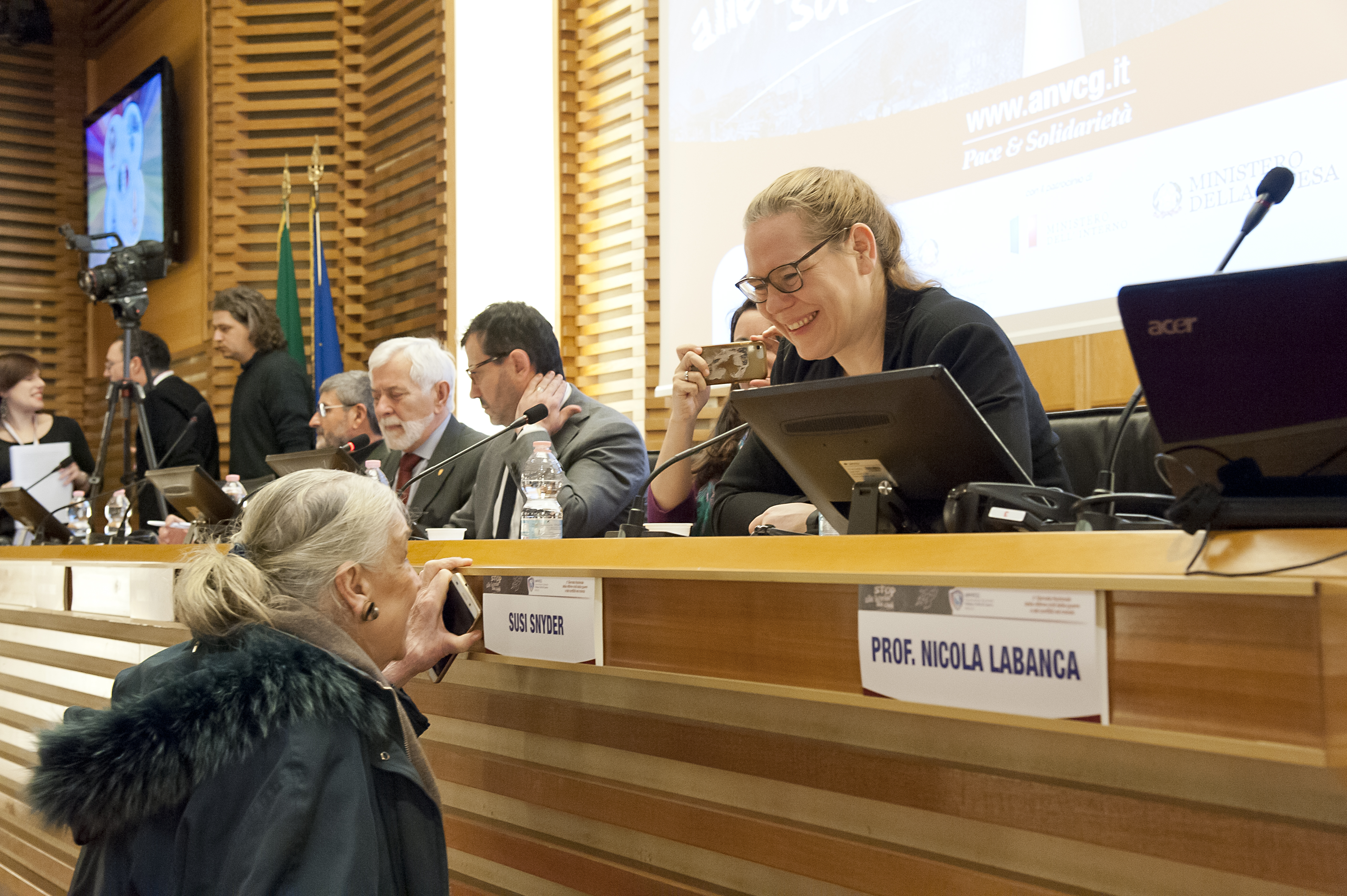The aim of such celebration is to preserve the memory of the world’s civilian losses and to promote the culture of peace. This year, the National Association of Civil War Victims ONLUS organized a conference for the occasion, called "Stop bombs on civilians", held at the School of Improvement for Police Forces, under the patronage of the Ministry of Education and Research (MIUR), the Ministry of Foreign Affairs and International Cooperation and the Ministry of Defence.
THE “STOP BOMBS ON CIVILIANS” CAMPAIGN
Through the intervention of authoritative speakers who succeeded at the table, the conference emphasized the international initiatives for the protection of civilian populations, illustrating the commitment of Italian institutions and the increasing active role of associationism.
The "Stop bombs on civilians" campaign was introduced as the result of the accession of ANVCG to the International Network on Explosive Weapons (INEW).
The campaign calls upon individual States and international organizations to: recognize that the use of explosive devices in populated areas tends to cause serious suffering to people and communities, both directly and by damaging vital infrastructures; commit to re-assess and strengthen rules and practices in the use of explosive weapons, making data available on their use and their effects; take action to ensure full respect of the rights of victims and survivors; identify universally accepted principles, to prohibit or limit the use of explosive weapons in highly populated areas.
THE DEBATE: FACTS AND FIGURES
The information provided at the conference outlined a dangerous and worrying framework. It is well acknowledged that, since the twentieth century, armed conflicts have had an increasing impact on civilians, who now represent around the 80% of all victims.
The causes of this dramatic scenario are manifold: on the one hand, in fact, scientific progress makes it easier and cheaper to use weapons and machines that are increasingly destructive and lethal; on the other hand, with the affirmation of democracy, people have become a key element for the fate of governments involved in the conflict.
Another relevant factor is the exponential increase in the bombing and in the use of destructive explosive devices in urban zones, which now often count on millions and millions of inhabitants gathered in a relatively small area (with a population density that easily exceeds 20,000 people per square km).
In addition to direct damage to people, destruction of buildings and infrastructures should not be underestimated, as it has very serious long-term implications on public health and on the future development of the affected area, given that the bombings cause pollution whose danger remains a threat for decades.
Lastly, one should not forget that migration is strongly linked to the destruction of urban centres, as it often constitutes the event that triggers the flee.
The bombing of densely populated areas has been highly condemned by the public opinion. However, as of today, international law has no general rules on this particular matter.
It is true that there are very important international treaties on the limitation in the use of certain weapons - anti-personnel mines, cluster bombs, incendiary weapons, etc. - but they have not yet been signed by all Nations, and they only indirectly address the protection of civilians in highly populated areas.
THE SPEAKERS’ TABLE
After the greeting of the Generale della Guardia di Finanza Gennaro Vecchione (director of the Specialization School for Police Forces), Michele Vigne, Vicar Vice-President of the ANVCG, opened the conference stressing on the increasing number of civilian casualties, which today make up 80% of total losses in conflicts, on today’s humanitarian emergency and the current threat of unexploded ordnance. "In the face of so much suffering the limitation of armaments and the promotion of the culture of peace have assumed a position of prominence within the Association, and have led to the adhesion to the campaign against the bombings on densely populated areas was born. The mobilization of civil society can lead to great results, as demonstrated by the example of the ICAN Campaign for the abolition of nuclear weapons. We are convinced that these efforts can lead to a better world, especially for the generations to come ».
Laura Boillot, INEW coordinator, stated that their mission is to ban all types of large-scale explosive weapons used on populated centers. The disturbing fact emerging from their studies is that 91% of the victims of such weapons are civilians. In addition to the direct and indirect damage caused, the bombings are also the main cause of internal displacement and large migrations in other countries.
The speech held by Susi Snyder, member of ICAN (Nobel Peace Prize 2017) focused on their daily work aimed at ending the great suffering caused by nuclear weapons, designed to create enormous damage. ICAN's international campaign has brought to great results, to the extent that a nuclear ban treaty is reached.
On the speakers' table there were also Sen Raffaela Bellot, Prof. Claudio Betti (President of Associazioni Combattentistiche e Partigiane), the Hon. Francesco Saverio Garofani, Prof. Nicola Labanca (President of the Inter-University Centre for Studies and Historical-Military Research), Pietro Ridolfi (President of the National Commission for International Humanitarian Law of the Italian Red Cross), Alessandro Cortese (Deputy General Manager / Central Director for security, disarmament and non-proliferation at the Ministry of Foreign Affairs and International Cooperation), Giuseppe Schiavello (Italian campaign against mines), Corrado Quinto (lawyer, expert in human rights and protection of civilians, who presented the work of the L'Osservatorio research center) and Nicolas Marzolino (ANVCG member).









